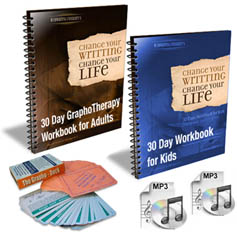I remember my dad teaching me the power of language at a very young age. Not only did my dad understand that specific words affect our mental pictures, but he understood that words are a powerful programming factor in lifelong success.
One particularly interesting event occurred when I was just eight years old. As a kid, I was always climbing trees and poles, and literally hanging around upside down from the rafters of our lake house. So, it came as no surprise to my dad to find me at the top of a 30-foot tree, swinging back and forth. My little eight-year-old brain didn’t realize the tree could break or I could get hurt. I just thought it was fun to be up so high.
My older cousin, Tammy, was in the same tree. She was hanging on to the first big limb, about ten feet below me. Tammy’s mother noticed us at the exact same time my dad did. About that time, a huge gust of wind came over the tree. I could hear the leaves start to rattle and the tree begin to sway. I remember my dad’s voice yelling over the wind, “Bart, hold on tightly.” So I did. The next thing I know, I heard Tammy screaming at the top of her lungs, lying flat on the ground. She had fallen out of the tree.

I scampered down the tree to safety. My dad later told me why she fell and I did not. Apparently, Tammy’s mother was not as astute a student of language as my father. When Tammy’s mother felt the gust of wind, she yelled out, “Tammy, don’t fall!” And Tammy did… fall.
My dad then explained to me that the mind has a very difficult time processing a negative image. In fact, people who rely on internal pictures cannot see a negative at all. In order for Tammy to process the command of not falling, her nine-year-old brain had to first imagine falling, then try to tell the brain not to do what it just imagined. Whereas my eight-year-old brain instantly had an internal image of me hanging on tightly.
This is one reason people who try to stop smoking struggle with the act of stopping smoking. They are running pictures all day of themselves smoking. Smokers are rarely taught to see themselves breathing fresh air and feeling great. The language itself becomes a barrier to success. Self-talk can be the key to stopping many, many bad habits, quickly and without harmful medication.
This concept is especially useful when you are attempting to break a bad habit or set a future goal. You can’t visualize not doing something. The only way to properly visualize not doing something is to actually find a word for what you want to do and visualize that. For example, when I was thirteen years old, I played for my junior high school football team. I tried so hard to be good, but I just couldn’t get it together at that age. I remember hearing the words run through my head as I was running out for a pass: “Don’t drop it!” Naturally, I dropped the ball.
My coaches were not skilled enough to teach us proper “self-talk.” They just thought some kids could catch and others couldn’t. I’ll never make it pro, but I’m now a pretty good Sunday afternoon football player, because all my internal dialogue is positive and encourages me to win. I wish my dad had coached me playing football instead of just climbing trees — I might have had a longer football career!
Here is a very easy demonstration to teach your kids and your friends the power of a toxic vocabulary. Ask them to hold a pen or pencil. Hand it to them. Now, follow my instructions carefully. Say to them, “Okay, try to drop the pencil.” Observe what they do.
|
The most effective way to effect positive change in your child using the kid’s workbook is when you, the parent or teacher, are working on your “Adult’s” workbook at the same time. This creates a time to learn together and you may improve yourself, too. The adults workbook is not to improve your handwriting; it was designed six years before the kid’s workbook to assist you with setting goals and using grapho-therapy to improve yourself. This combination kit includes: one Adult’s Workbook, one Kid’s Workbook, two instructional audio CD’s, a Special Report, the Grapho-Deck. |
Most people release their hand and watch the pencil hit the floor. You respond, “You weren’t paying attention. I said TRY to drop the pencil. Now please do it again.” Most people then pick up the pencil and pretend to be in excruciating pain while their hand tries but fails to drop the pencil.
The point is made.

If you tell your brain you will “give it a try,” you are actually telling your brain to fail. I have a “no try” rule in my house and with everyone I interact with. Either people will do it or they won’t. Either they will be at the party or they won’t. I’m brutal when people attempt to lie to me by using the word try.
Do they think I don’t know they are really telegraphing to the world they have no intention of doing it, but they want me to give them brownie points for pretended effort?
You will never hear the words “I’ll try” come out of my mouth unless I’m teaching this concept in a seminar. If you “try” to do something, your unconscious mind has permission not to succeed. If I truly can’t make a decision, I will tell the truth. “Sorry, John. I’m not sure if I will be at your party or not. I’ve got an outstanding commitment. If that falls through, I will be there. Otherwise, I will not. Thanks for the invite.”
People respect honesty. So remove the word “try” from your vocabulary. My dad also told me that psychologists claim it takes seventeen positive statements to offset one negative statement. I have no idea if it is true, but the logic holds true. It might take up to seventeen compliments to offset the emotional damage of one harsh criticism.
These are concepts that are especially useful when raising children. Ask yourself how many compliments you give yourself daily versus how many criticisms. Heck, I know you are talking to yourself all day long. We all have internal voices that give us direction.
So, are you giving yourself the 17:1 ratio or are you shortchanging yourself with toxic self-talk like: “I suck. I’m fat. Nobody will like me. I’ll try this diet. I’m not good enough. I’m so stupid. I’m broke. Etc. Etc.”
If our parents can set a lifetime of programming with one wrong statement, imagine the kind of programming you are doing on a daily basis with your own internal dialogue.
Here is a list of Toxic Vocabulary words. Notice when you or other people use them.
| ButIf
Would have Could have Don’t |
TryMight
Should have Can’t |
But – negates any words that are stated before it.
If – presupposes that you may not.
Would have – past tense that draws attention to things that didn’t actually happen.
Should have – past tense that draws attention to things that didn’t actually happen (and implies guilt).
Could have – past tense that draws attention to things that didn’t actually happen but the person tries to take credit as if it did happen.
Try – presupposes failure.
Might – does nothing definite. It leaves options for your listener.
Can’t / Don’t – These words force the listener to focus on exactly the opposite of what you want. This is a classic mistake that parents and coaches make without knowing the damage of this linguistic error.
Examples:
Toxic phrase: “Don’t drop the ball!”
Likely result: Drops the ball
Better language: “Catch the ball!”
Toxic phrase: “You shouldn’t watch so much television.”
Likely result: Watches more television.
Better language: “I read that too much television makes people stupid. You might find yourself turning that TV off and picking up one of those books more often!”
Exercise:
Take a moment to write down all the phrases you use on a daily basis or any toxic self-talk that you have noticed yourself using.
Write these phrases down so you will begin to catch yourself as they occur and change them.
| Toxic Phrase | Re-written Phrase |
____________ ________________
____________ ________________
____________ ________________
____________ ________________
____________ ________________
____________ ________________
|
by Bart Baggett
Brief Description:
Bart Baggett’s latest book reveals the psychological “Success Secrets of the Rich and Happy.” It is available now in INSTANT DOWNLOAD from anywhere in the world and paperback in stock. |




Permalink
What a fantastic article, and so true. If we could only put forth encouragement at all times. It is understood that sometimes the negative projected words are from the other’s internal feelings of their own self-worth. They reflect their own feelings of inadequacy, and they are transferred to others unknowingly with damage associated with the negative tauntings. Whether it be the need to feel needed, hence creating that push towards the other in a negative for the other to feel that they “need” that person, or just to bring them to where they are – unhappy and with a low self esteem. This article is wonderful in capturing how to build a child’s confidence and self esteem, the spirit within, rather than diminish it. A child can be any age, even well into their 40’s if they still receive those negative words from a parent, they continue to eat away at whom they can be. The longer these negative words are projected, the more damaging they are. If a young couple can start at the beginning to follow the steps noted above, they are most likely assured to have solid minded, self confident and happy children, who grow into successful and happy adults. Again…. thanks for sharing.
Permalink
Thank you for the comment LaurieAnn. Our words are so powerful, more powerful than most of us know… even our own self-talk. I wish more people would harness the power of language to empower themselves and their families.
Permalink
Handwriting is the tracks of your mind across the page. Speech is the tracks of your mind across the table, the room, the gym, the yard or the stadium. Selection matters. So does listening.
Maxwell
Permalink
The story of you and your cousin tammy .. i read it in your book ( the success secrets of the rich and happy) long before i became a mother .. and that story is vivid in my mind all the time and helped me alottttttt in picking the right words with my kid ..thank you so much for it.
Lina,